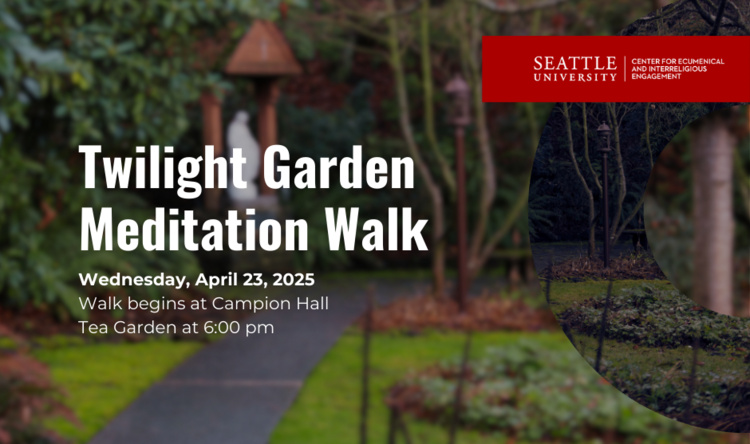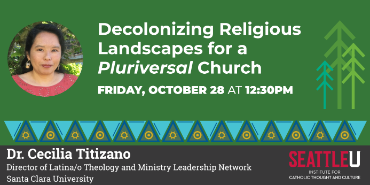Laudato Si' Events
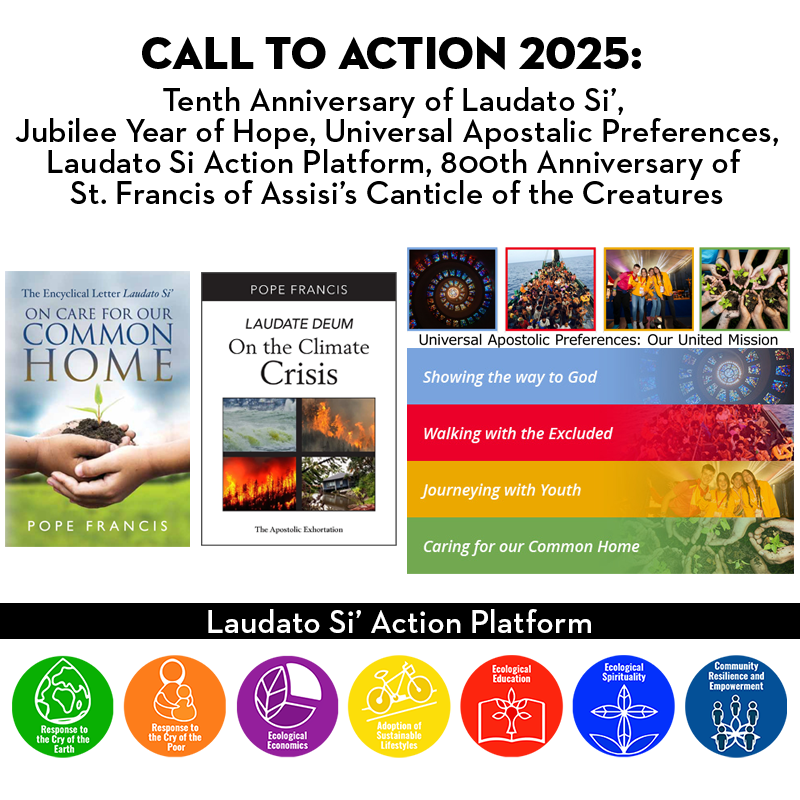
UPCOMING EVENTS
Save the Date!
- March 3 to April 25 - Ignatian Advocacy Madness
- All April - KXSU Earth Month E-Waste Drive
- April 3 - Conversations with Governor Bob Ferguson
- April 8 - Threadhawk Thrift & Kids Clothing Swap
- April 22 - EARTH TALKS on EARTH DAY
- April 23 - Twilight Garden Meditation Walk
- April 23 & 29 - 'Come, Have Breakfast' Book Group
- April 26 - Env. Justice with Dr. Robert Bullard
- April 30 - Env. Health Care with Dr. Beth Schenk
- May 7 & 28 - Laudato Si’ Reading Group
- May 20 - Laudato Si' Celebration with Dr. Tuchman
EARTH MONTH 2025 at SU
Past Events
Northwest Jesuit Advocacy Summit
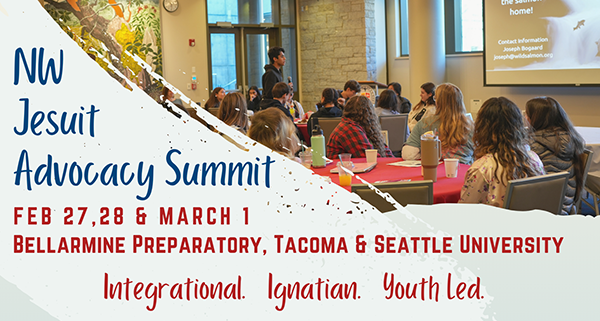
The Northwest Jesuit Advocacy Summit brings together Jesuit students, volunteers, parishioners, faculty, priests and other leaders to use the power of our collective voices to put our faith into action.
Held from February 27, 28, and March 1, 2025, in Seattle and Tacoma, the event takes high-school students through a 3-day experience of Ignatian reflection towards prophetic action, with university students, Jesuit volunteers, parishioners, faculty and other adult allies joining for evening programming and a direct-action town-hall on Saturday morning
In the spirit of the Jesuit Apostolic Preference to “walk with youth toward a hope-filled future” parishioners, priests, teachers and community members are encouraged to join the summit to network with other Ignatian justice leaders, join in meaningful spiritual conversation with Jesuit students leading the next generation of justice work, and -most importantly- stand with these young leaders and Native-led activist groups as we engage in faithful collective action in solidarity with the Se Si Le and the Sacred Salmon Campaign.
Adults are invited to attend any of the below programs. You do not need to attend every event. The Saturday morning student-led town hall with elected officials is particularly important moment to stand with students as they take action, so if you can only attend one event, we encourage you to be there!
- Thursday February 27th at Bellarmine High Tacoma
5:15 pm: “Already Ignited” Adult Justice Leader Dinner
6:00 pm: Story Slam on Indigenous Climate Solidarity - Friday February 28th at Seattle University
6:30 pm: Intergenerational Conversation on Creation, Justice and Spirituality with Jesuit students and Jesuit Volunteers - Saturday, March 1st at Seattle University
10:00 am: Sacred Salmon Town Hall: Public Witness in Solidarity with Native Peoples on Salmon Watershed Protection



Faculty Research Presentation: Shared Concerns, Competing Perspectives
Dr. Stacey Jones and Dr. Dean Peterson, Albers School of Business & Economics
Wednesday, March 12, 2025
12:00pm to 1:30pm (lunch provided)
Pigott 107, Seattle University
The project makes a case for the inclusion of Catholic Social Thought (CST) in the introductory economics course. We argue that the contrast between the perspectives of CST and economics, especially with regard to the environment, can deepen students’ understanding of the underlying assumptions of economics and enable students to see the role that economics should play in an interdisciplinary effort to address climate change. The paper provides practical guidance to economics faculty who wish to bring the urgent call of Laudato Si' and Laudate Deum into their classrooms effectively.


Conversations with Governor Bob Ferguson
Rise of the Governors: Navigating contrasts, chaos, and the Constitution
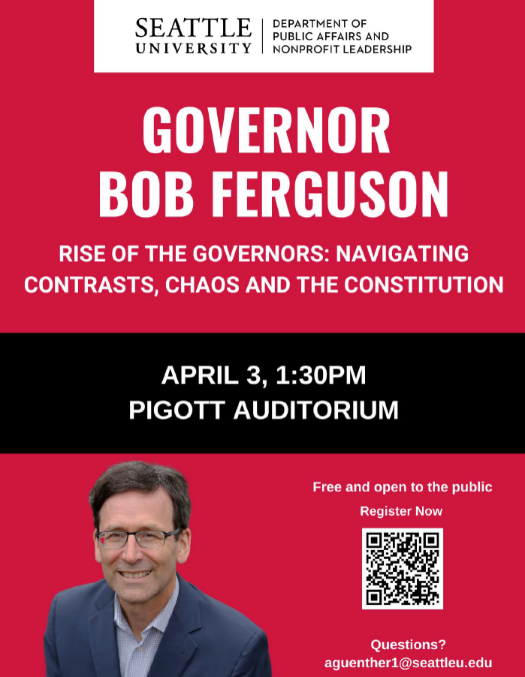
Thursday, April 3rd at 1:30 pm
Pigott Auditorium
Free and open to the public! Click here to RSVP
Please join the Department of Public Affairs and Nonprofit Leadership for their quarterly Conversations event. On Thursday, April 3, they will be hosting the newly-elected Washington state governor, Bob Ferguson, in conversation about pressing issues facing the state and the nation. The conversation will focus on how governors are managing the change in the relationship with federal government and the budget cuts that states are experiencing to a variety of programs: for veterans, people living in poverty, health care, medical research, climate, forest and energy management, and more.



Ignatian Advocacy Madness: When Justice is the Champion
March 3 – April 25, 2025
Online
Click here to learn more about Ignatian Advocacy Madness
Ignatian Advocacy Madness has begun! This isn't just a competition; it's a call to action for the Seattle University campus community. Hosted by the Ignatian Solidarity Network, it's an opportunity for everyone to learn, pray, and act for just migration and environmental policies.
If you're hosting events related to environmental justice or humane migration policy, SU wants to hear from you. Share your activities with Campus Ministry and the Center for Social Transformation and Leadership, and they’ll include them in their entries to highlight your impactful work. Email the CSTL at CSTL@seattleu.edu for submissions, more information or questions.




KXSU Earth Month E-Waste Drive

All month of April
Drop-off box in Sinegal, outside of room 230
Do you have any old headphones, chargers, cables or other sorts of electronics laying around the house that you don’t use anymore? Then stop by the KXSU studio during the month of April in honor of Earth Month for our E-Waste drive! Only 17% of e-waste is properly recycled so do your part and donate to keep electronic waste out of our landfills. Our drop-off box will be located in Sinegal, outside of room 230 through April 30th


Threadhawk Thrift & Kids Clothing Swap
Tuesday, April 8, 2025, 11:00AM – 1:30PM
Student Center, 1st floor
Do you have professional clothing items you could donate for our students? Are you looking for gently used kids clothing or books? Join in this "all-in-one" event to support our students. This event is sponsored by Career Engagement, Wellness & Health Promotion and Parent & Family Engagement.
Questions or want to drop off items for the event? Contact Kiyana Higa (khiga@seattleu.edu), Laurie Prince (lprince@seattleu.edu) or Nodia Rogers (nrogers@seattleu.edu).

EARTH TALKS on EARTH DAY
Earth Day, April 22, 11:30AM-1:30PM:
- 11:45AM: Doors open – Light appetizers
- 12:00PM: Program starts:
- Welcome by Dr. Laura Spitz, Vice Provost for Global Engagement
- Five-minute “Earth Talks” by eight SU faculty and students
- 1:00PM: Q&A with presenters
- 1:20PM: Event concludes
Student Center “Le Roux Room” (STCN #160)
Join us for the 6th edition of “Earth Talks,” Seattle University’s annual Earth Day celebration showcasing inspirational 5-min talks on “Care for our Common Home” by students, faculty, and staff from across different schools and programs at SU. Presentations will cover advocacy, artwork, research, and service projects related to environmental justice and sustainability. Join us and support fellow students and colleagues presenting! This event is a Laudato Si’ Action Platform initiative sponsored by the Center for Environmental Justice and Sustainability (CEJS), Institute for Catholic Thought and Culture (ICTC), Center for Ecumenical and Interreligious Engagement (CEIE), and the Roundglass India Center
Event program and more details
Twilight Garden Meditation Walk
Wednesday, April 23, 2025, 6:00PM
Where: The walk will start at the Campion Tea Garden
Click for more information and to register
Join CEIE and SU Gardeners for a walk through SU gardens accompanied by simple sensory meditations.
This event celebrates Earth Day and the 10th anniversary of Laudato Si with simple tools for deepening your connection with the earth.
After our walk, we'll have time to gather for food and conversation.
This event is cosponsored by CEIE, Seattle U Facilities & Grounds, SU Psychology Department.

Come, Have Breakfast
Book Discussion Group
.png)
- Wednesday, April 23, 12-1:30 pm in person, lunch provided
- Tuesday, April 29, 12:30-1:45 pm on Zoom, in discussion with Sr. Johnson
“‘Come, have breakfast’ (Jn 21:12) These three simple words followed by generous action open a portal into an ecological image of the living God who is active with cordial hospitality toward all creatures, nurturing their lives, desiring that all should be fed.”
Join ICTC for a two-session group where we will read and discuss prize-winning theologian Elizabeth Johnson’s views on planet Earth, its beauty and threatened state, through the lens of scripture. Each luminous meditation offers a snapshot of one aspect of the holy mystery who creates, indwells, redeems, vivifies, and sanctifies the whole world. Together, they offer a panoramic view of the living God who loves the earth, accompanies all its creatures in their living and their dying, and moves us to care for our uncommon common home. For the first session, participants will have read a good portion of the book and will participate in preparing questions for our second session, a Zoom discussion with Sr. Johnson.
Elizabeth A. Johnson, a member of the Sisters of St. Joseph, is Distinguished Professor of Theology Emerita, Fordham University, NYC. A former president of the Catholic Theological Society of America and also of the American Theological Society, an ecumenical association, she is winner of the John Courtney Murray Award for distinguished achievement in theology, and numerous other awards. Her book She Who Is received the Grawemeyer Award in Religion. Following her retirement, she was inducted into Fordham University’s Hall of Honor. Among her many books are Friends of God and Prophets: A Feminist Theological Reading of the Communion of Saints; Quest for the Living God: Mapping Frontiers in the Theology of God; Truly Our Sister: A Theology of Mary in the Communion of Saints; and Ask the Beasts: Darwin and the God of Love. Her previous Orbis books include Creation and the Cross and Abounding in Kindness: Writings for the People of God.


Quest for Environmental Justice: The Challenge and Promise
Dr. Robert D. Bullard, “Father of Environmental Justice”
Saturday, April 26, 2025, 10:00 AM – 12:00 PM
Pigott Auditorium
Click here for more information and to RSVP
Join Dr. Robert Bullard, the father of environmental justice, for a transformative lecture titled Quest for Environmental Justice: The Challenge and Promise. With decades of pioneering work as a sociologist and author, Dr. Bullard will explore the roots of the environmental justice movement, its connection to faith, civil rights, and the policies that have shaped systemic inequities. As we mark the 10th anniversary of Laudato Si, Pope Francis’ call to care for our common home, this conversation takes on even greater urgency—challenging us to recognize environmental justice as a moral obligation and an act of solidarity with the most vulnerable.
Dr. Bullard's message goes beyond identifying barriers—it is one of resilience, action, and hope. He will inspire attendees to see how marrying research, data, and science with faith and community-driven action can create lasting change. In alignment with Seattle University’s deep commitment to sustainability and justice, this event offers a powerful opportunity to reflect on our collective responsibility and take meaningful steps to build a more just and equitable future.
Who Should Attend:
This lecture is ideal for anyone committed to justice, equity, and sustainability. It’s designed for community leaders, educators, students, faith-based organizations, activists, policymakers, and individuals passionate about creating a healthier, fairer world through collective action.
This is more than a lecture—it’s a call to action and a vision for change.
About Dr. Bullard
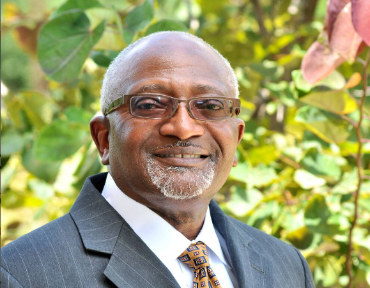
Robert D. Bullard is often described as the father of environmental justice. He is the former Dean of the Barbara Jordan-Mickey Leland School of Public Affairs at Texas Southern University 2011-2016. Professor Bullard currently is Distinguished Professor of Urban Planning and Environmental Policy and Director of the Bullard Center for Environmental and Climate Justice. Prior to coming to TSU he was founding Director of the Environmental Justice Resource Center at Clark Atlanta University. He received his Ph.D. degree from Iowa State University. He is an award-winning author of eighteen books that address sustainable development, environmental racism, urban land use, industrial facility siting, community reinvestment, housing, transportation, climate justice, disasters, emergency response, and community resilience, smart growth, and regional equity. He is co-founder of the HBCU Climate Change Consortium. Dr. Bullard is a proud U.S. Marine Corps veteran.


Planetary Health: Solutions for Health Care
The Drs. Luth M. and Narciso P. Tenorio Endowed Scholar and Lectureship
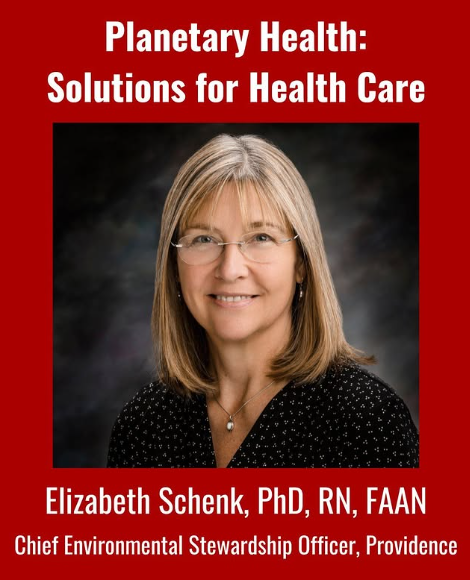
Wednesday, April 30, 2025, 4:00PM – 6:00PM
- 4:00PM: Registration and Poster Presentation with Light Refreshments
Prior to the event program, enjoy a poster presentation featuring scholarly work by SU nursing faculty and students
- 5:00PM: Event Program
Pigott Auditorium
Click Here for More Info and Registration
Seattle University College of Nursing and the Center for Environmental Justice and Sustainability welcome Elizabeth Schenk, PhD, RN, FAAN, Chief Environmental Stewardship Officer at Providence for a discussion on the environmental challenges health care professionals and organizations face using a planetary health lens, sharing effective solutions tested in one of the nation’s largest health systems. Health care has a long history of creative solutions, innovation, and commitment. Using these skills, health care has opportunities to be less polluting, less wasteful, and less consumptive while building resilience, committed to its principles of justice and service.

Laudato Si’ Reading Group
for faculty and staff in celebration of the Laudato Si’ 10th anniversary
May 7 and May 28, at 12:00 p.m.-1:30 p.m. Lunch included
This May marks the 10th anniversary of the publication of Pope Francis’ powerful and prophetic encyclical letter Laudato si’: On Care for Our Common Home, and as part of our celebration the Center for Jesuit Education invites you to a faculty and staff reading group. The group will meet twice and discuss roughly half of the text at each gathering.
From Laudato Si':
Our insistence that each human being is an image of God should not make us overlook the fact that each creature has its own purpose. None is superfluous. The entire material universe speaks of God’s love, his boundless affection for us. Soil, water, mountains: everything is, as it were, a caress of God. The history of our friendship with God is always linked to particular places which take on an intensely personal meaning; we all remember places, and revisiting those memories does us much good. Anyone who has grown up in the hills or used to sit by the spring to drink, or played outdoors in the neighborhood square; going back to these places is a chance to recover something of their true selves. (§84)
Please join as we reflect on our beautiful and fragile home and on Pope Francis’ call to do more to care for both the earth and our fellow human beings!
If you have any questions, please email Yancy Dominick at dominick@seattleu.edu.
Laudato Si' Celebration with Keynote Dr. Nancy Tuchman
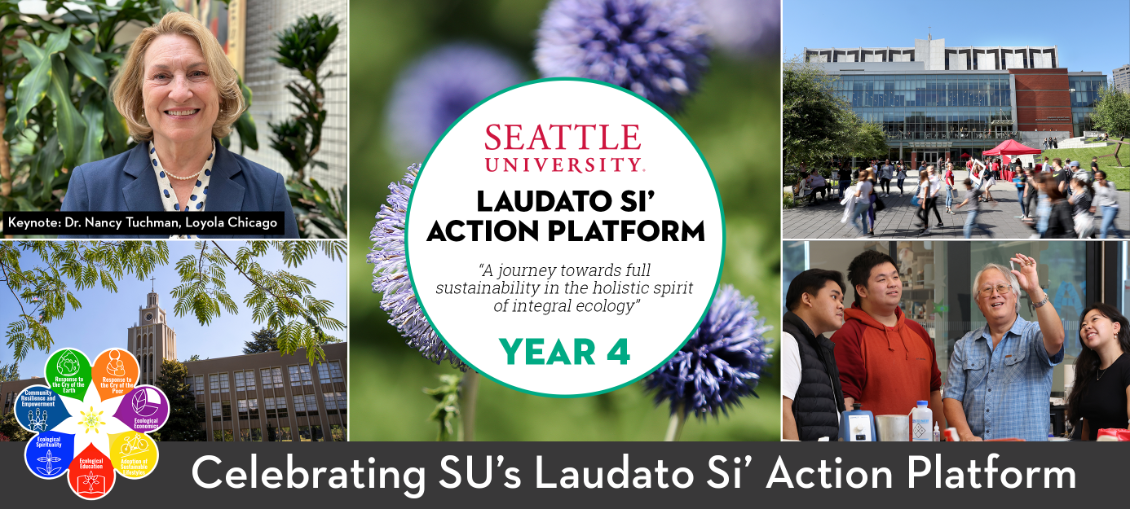
Tuesday, May 20, 3:00 - 5:00 pm
STCN 160 Le Roux Room
For planning purposes, the favor of an RSVP would be appreciated.
President Eduardo Peñalver invites faculty and staff to celebrate the accomplishments of Seattle University’s fourth year of the Laudato Si Action Platform and the 10th Anniversary of Laudato Si’. Dr. Nancy Tuchman, Founding Dean of the School of Environmental Sustainability at Loyola University Chicago, who will present on the centrality of environmental justice and sustainability in Jesuit education. Following Dr. Tuchman’s talk, faculty and student panels will share how integral ecology has informed their teaching, research, and learning. A celebration reception concludes the event at 4:30pm.
About Dr. Tuchman
Nancy Tuchman spent the first 14 years of her career as a Professor of Aquatic Ecology in the Department of Biology at Loyola University Chicago. In 2002-2003 she served as a Program Officer in the Ecosystem Studies Program at the National Science Foundation, then returned to Loyola to serve as the Associate Provost for Research for five years (2004–08). In 2005 she founded and directed the Center for Urban Environmental Research and Policy (CUERP) at Loyola. From 2010 – 2013 she served as the University's Vice Provost before being appointed Founding Dean of the Institute of Environmental Sustainability (IES).
Schedule:
3:00pm: Welcome
3:10pm: Keynote - Keeping Pope Francis’s Call to Action Alive in Jesuit Higher Ed: Addressing the Cry of the Earth and the Cry of the Poor in the AJCU and at Loyola University Chicago
4:00pm: Faculty Panel
-
Dr. Henry Louie, PhD, Professor Electrical Engineering, College of Science and Engineering
-
Dr. Valentina Zamora, PhD, Professor of Accounting, Albers School of Business and Economics
-
Dr. David Kwon, PhD, Assistant Professor, Theology and Religious Studies
4:15pm: Student Panel
Team 1 (Environmental Studies majors specializing in ecological systems)
-
Solana Dicus Breen
-
Isabelle (Izzy)
-
Shedd
Team 2 (Psychology majors minoring in Catholic Studies)
-
Reed Odette
-
Abbygail Wells
-
Iangsamang Phoom
4:30pm: Closing and Reception
Laudato Si' Action Platform Summits and Celebrations
Inauguration
October 20, 2022
Year T2
February 15, 2024
Other Events - Care for Our Common Home

Our Common Home And The Climate Crisis: A Multi-Disciplinary Discussion - Laudate Deum Panel
Thursday, February 1, 2024
Le Roux Conference Room, Student Center
Learn more about Laudato Si' and Laudate Deum and how different sectors integrate the documents of Pope Francis into their work. Join us for an interdisciplinary panel with faculty from across campus:
- Moderator: Jeanette Rodriguez, ICTC Executive Director and Professor, Theology and Religious Studies
- Overview of LS and LD: Jessica Ludescher Imanaka, Associate Professor, Albers School of Business and Economics and Department of Philosophy
- Panelists:
- Ajay Abraham, Associate Professor, Marketing at Albers
- Colette Taylor, Professor, College of Education
- Jason Wirth, Professor, Philosophy
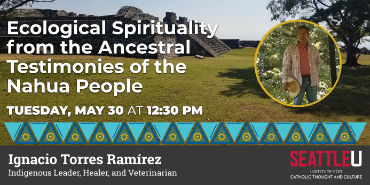
Ecological Spirituality from the Ancestral Testimonies of the Nahua People with Ignacio Torres Ramírez
Tuesday, May 30, 2023
Student Center 130
Presentation will be in Spanish with English translation
Ancestral Testimonies of the Nahua People:
I will share with you some of the Nahua cosmovision within a pre-Hispanic historical context as well as one of conquest. We will travel to the past, long before the arrival of the Aztecs and the Spanish conquest to introduce you to the deep cosmology of our ancestors. We will journey through an historical path covering the arrival of the Aztecs, the Spanish conquest and indigenous, black, and popular resistance. Over the course of our journey I will present the powerful traditions, uses and customs such as ceremonies of the earth and the communal planting of the three sisters (corn, bean and squash) as a sacred practice of our cosmovision.
About Ignacio Torres Ramírez:
I am proud to be one of the original peoples of the indigenous community of Amatlán de Quetzalcoatl, in the Municipality of Tepoztlán in the State of Morelos. It has deep ancestral roots from which I receive my traditional name Nahui Cuauhtli, meaning Four Eagle. Amongst the original peoples we keep traditions and customs based on our land, our spirituality and our cosmovision. One example being the Communal Council naming the guardian of the sacred conch, for the use of general ceremonies. In 1992, I had the great honor of being named guardian of the community’s conch. As in many indigenous communities, Amatlán is one of the spaces that we practice curandería and many of our families come from this carefully preserved lineage to care for the community’s physical, mental, emotional and spiritual health. For 2000 years my family has come from this line of healing.
I graduated from the Metropolitan Autonomous University in CDMX as a veterinarian doctor. My interest is the health of animals but also the health of the owners of the animals. This led me to graduate from the Centro de Desarrollo Humano hacía la Comunidad-Universidad Autónoma del Estado de Morelos (CEDHEC-UAEM) (Centre for Human Development for the Community) as a Corporal Therapist offering massage, chiropractic and traditional herbal medicine. I continue my training for a diploma in acupuncture and in this way I am able to serve the health of animals and humans.

Turning the Tide for Ecology - 2023 Catholic Earth Day Summit
Saturday, April 22, 2023
Student Center
Join the Creation Care Network for its annual environmental justice summit! The day will provide space to ground our collective work spiritually, discern how the Spirit is calling us to build reciprocity with the Earth, and act together for climate justice! The day will include:
• Mass with Archbishop Paul D. Etienne
• Keynotes on integral ecology and salmon recovery
• Discernment on how the Spirit is calling us to care for our common home
• Panel on climate action
• Group reflections on environmental justice
• And more! This free in-person event is open to all and includes a vegetarian lunch & parking.
Hosted by: Institute for Catholic Thought and Culture, and Creation Care Network Sponsored by: Archdiocese of Seattle, St. James Cathedral Seattle, St. Joseph Parish, Institute for Catholic Thought and Culture, Catholic Climate Covenant, and Intercommunity Peace & Justice Center
- Watch the following sessions videos here:
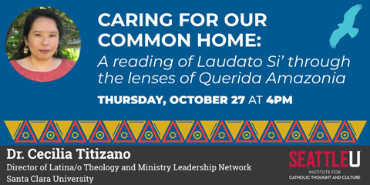
Caring for Our Common Home: A reading of Laudato Si' through the lenses of Querida Amazonia
Thursday, October 27, 2022
Le Roux Room, Student Center 160
Pope Francis, in his encyclical Laudato Si' calls for an ecological conversion. In his view, we are no longer the owners of creation, nor is nature available at our disposal. Yet, the ecological conversion that Pope Francis seeks is almost impossible without problematizing traditional substance ontology or ways of being. We need a complete overhaul of how we understand reality. I suggest Pope Francis offers us a pathway forward in his apostolic exhortation letter Querida Amazonia. I invite you to navigate the richness that emerges from reading Laudato Si' through the lenses of Querida Amazonia.
Decolonizing Religious Landscapes for a Pluriversal Church
Friday, October 28, 2022
Casey 515
An event for faculty and staff
Across the Abya Yala continent, indigenous people, many Christians themselves, are decolonizing the religious landscape, placing their epistemologies and philosophical/spiritual principles at the theological table. In this presentation, I suggest that the first step to incarnate Francis's cultural dream of intercultural encounters among cultures, is to pause, and make sure that we truly comprehend indigenous complex philosophical systems. Then, through an inter-religious, intercultural hermeneutics, place in dialogue indigenous philosophical/spiritual systems and the foundational theological and metaphysical assumptions that sustains Christian dogmas. The result could be a richer pluricultural Church.

.png)
